- Home
- G. K. Chesterton
The Complete Father Brown Mysteries Collection Page 32
The Complete Father Brown Mysteries Collection Read online
Page 32
“The poor lady’s dress was torn,” said the witness, “because it was caught in a panel that slid to just behind her. She struggled to free herself, and as she did so Parkinson came out of the prisoner’s room and lunged with the spear.”
“A panel?” repeated the barrister in a curious voice.
“It was a looking-glass on the other side,” explained Father Brown. “When I was in the dressing-room I noticed that some of them could probably be slid out into the passage.”
There was another vast and unnatural silence, and this time it was the judge who spoke. “So you really mean that when you looked down that passage, the man you saw was yourself — in a mirror?”
“Yes, my lord; that was what I was trying to say,” said Brown, “but they asked me for the shape; and our hats have corners just like horns, and so I — ”
The judge leaned forward, his old eyes yet more brilliant, and said in specially distinct tones: “Do you really mean to say that when Sir Wilson Seymour saw that wild what-you-call-him with curves and a woman’s hair and a man’s trousers, what he saw was Sir Wilson Seymour?”
“Yes, my lord,” said Father Brown.
“And you mean to say that when Captain Cutler saw that chimpanzee with humped shoulders and hog’s bristles, he simply saw himself?”
“Yes, my lord.”
The judge leaned back in his chair with a luxuriance in which it was hard to separate the cynicism and the admiration. “And can you tell us why,” he asked, “you should know your own figure in a looking-glass, when two such distinguished men don’t?”
Father Brown blinked even more painfully than before; then he stammered: “Really, my lord, I don’t know unless it’s because I don’t look at it so often.”
The Mistake of the Machine
FLAMBEAU and his friend the priest were sitting in the Temple Gardens about sunset; and their neighbourhood or some such accidental influence had turned their talk to matters of legal process. From the problem of the licence in cross-examination, their talk strayed to Roman and mediaeval torture, to the examining magistrate in France and the Third Degree in America.
“I’ve been reading,” said Flambeau, “of this new psychometric method they talk about so much, especially in America. You know what I mean; they put a pulsometer on a man’s wrist and judge by how his heart goes at the pronunciation of certain words. What do you think of it?”
“I think it very interesting,” replied Father Brown; “it reminds me of that interesting idea in the Dark Ages that blood would flow from a corpse if the murderer touched it.”
“Do you really mean,” demanded his friend, “that you think the two methods equally valuable?”
“I think them equally valueless,” replied Brown. “Blood flows, fast or slow, in dead folk or living, for so many more million reasons than we can ever know. Blood will have to flow very funnily; blood will have to flow up the Matterhorn, before I will take it as a sign that I am to shed it.”
“The method,” remarked the other, “has been guaranteed by some of the greatest American men of science.”
“What sentimentalists men of science are!” exclaimed Father Brown, “and how much more sentimental must American men of science be! Who but a Yankee would think of proving anything from heart-throbs? Why, they must be as sentimental as a man who thinks a woman is in love with him if she blushes. That’s a test from the circulation of the blood, discovered by the immortal Harvey; and a jolly rotten test, too.”
“But surely,” insisted Flambeau, “it might point pretty straight at something or other.”
“There’s a disadvantage in a stick pointing straight,” answered the other. “What is it? Why, the other end of the stick always points the opposite way. It depends whether you get hold of the stick by the right end. I saw the thing done once and I’ve never believed in it since.” And he proceeded to tell the story of his disillusionment.
It happened nearly twenty years before, when he was chaplain to his co-religionists in a prison in Chicago — where the Irish population displayed a capacity both for crime and penitence which kept him tolerably busy. The official second-in-command under the Governor was an ex-detective named Greywood Usher, a cadaverous, careful-spoken Yankee philosopher, occasionally varying a very rigid visage with an odd apologetic grimace. He liked Father Brown in a slightly patronizing way; and Father Brown liked him, though he heartily disliked his theories. His theories were extremely complicated and were held with extreme simplicity.
One evening he had sent for the priest, who, according to his custom, took a seat in silence at a table piled and littered with papers, and waited. The official selected from the papers a scrap of newspaper cutting, which he handed across to the cleric, who read it gravely. It appeared to be an extract from one of the pinkest of American Society papers, and ran as follows:
“Society’s brightest widower is once more on the Freak Dinner stunt. All our exclusive citizens will recall the Perambulator Parade Dinner, in which Last-Trick Todd, at his palatial home at Pilgrim’s Pond, caused so many of our prominent debutantes to look even younger than their years. Equally elegant and more miscellaneous and large-hearted in social outlook was Last-Trick’s show the year previous, the popular Cannibal Crush Lunch, at which the confections handed round were sarcastically moulded in the forms of human arms and legs, and during which more than one of our gayest mental gymnasts was heard offering to eat his partner. The witticism which will inspire this evening is as yet in Mr Todd’s pretty reticent intellect, or locked in the jewelled bosoms of our city’s gayest leaders; but there is talk of a pretty parody of the simple manners and customs at the other end of Society’s scale. This would be all the more telling, as hospitable Todd is entertaining in Lord Falconroy, the famous traveller, a true-blooded aristocrat fresh from England’s oak-groves. Lord Falconroy’s travels began before his ancient feudal title was resurrected, he was in the Republic in his youth, and fashion murmurs a sly reason for his return. Miss Etta Todd is one of our deep-souled New Yorkers, and comes into an income of nearly twelve hundred million dollars.”
“Well,” asked Usher, “does that interest you?”
“Why, words rather fail me,” answered Father Brown. “I cannot think at this moment of anything in this world that would interest me less. And, unless the just anger of the Republic is at last going to electrocute journalists for writing like that, I don’t quite see why it should interest you either.”
“Ah!” said Mr Usher dryly, and handing across another scrap of newspaper. “Well, does that interest you?”
The paragraph was headed “Savage Murder of a Warder. Convict Escapes,” and ran: “Just before dawn this morning a shout for help was heard in the Convict Settlement at Sequah in this State. The authorities, hurrying in the direction of the cry, found the corpse of the warder who patrols the top of the north wall of the prison, the steepest and most difficult exit, for which one man has always been found sufficient. The unfortunate officer had, however, been hurled from the high wall, his brains beaten out as with a club, and his gun was missing. Further inquiries showed that one of the cells was empty; it had been occupied by a rather sullen ruffian giving his name as Oscar Rian. He was only temporarily detained for some comparatively trivial assault; but he gave everyone the impression of a man with a black past and a dangerous future. Finally, when daylight had fully revealed the scene of murder, it was found that he had written on the wall above the body a fragmentary sentence, apparently with a finger dipped in blood: ‘This was self-defence and he had the gun. I meant no harm to him or any man but one. I am keeping the bullet for Pilgrim’s Pond — O.R.’ A man must have used most fiendish treachery or most savage and amazing bodily daring to have stormed such a wall in spite of an armed man.”
“Well, the literary style is somewhat improved,” admitted the priest cheerfully, “but still I don’t see what I can do for you. I should cut a poor figure, with my short legs, running about this State after an athletic assassin o
f that sort. I doubt whether anybody could find him. The convict settlement at Sequah is thirty miles from here; the country between is wild and tangled enough, and the country beyond, where he will surely have the sense to go, is a perfect no-man’s land tumbling away to the prairies. He may be in any hole or up any tree.”
“He isn’t in any hole,” said the governor; “he isn’t up any tree.”
“Why, how do you know?” asked Father Brown, blinking.
“Would you like to speak to him?” inquired Usher.
Father Brown opened his innocent eyes wide. “He is here?” he exclaimed. “Why, how did your men get hold of him?”
“I got hold of him myself,” drawled the American, rising and lazily stretching his lanky legs before the fire. “I got hold of him with the crooked end of a walking-stick. Don’t look so surprised. I really did. You know I sometimes take a turn in the country lanes outside this dismal place; well, I was walking early this evening up a steep lane with dark hedges and grey-looking ploughed fields on both sides; and a young moon was up and silvering the road. By the light of it I saw a man running across the field towards the road; running with his body bent and at a good mile-race trot. He appeared to be much exhausted; but when he came to the thick black hedge he went through it as if it were made of spiders’ webs; — or rather (for I heard the strong branches breaking and snapping like bayonets) as if he himself were made of stone. In the instant in which he appeared up against the moon, crossing the road, I slung my hooked cane at his legs, tripping him and bringing him down. Then I blew my whistle long and loud, and our fellows came running up to secure him.”
“It would have been rather awkward,” remarked Brown, “if you had found he was a popular athlete practising a mile race.”
“He was not,” said Usher grimly. “We soon found out who he was; but I had guessed it with the first glint of the moon on him.”
“You thought it was the runaway convict,” observed the priest simply, “because you had read in the newspaper cutting that morning that a convict had run away.”
“I had somewhat better grounds,” replied the governor coolly. “I pass over the first as too simple to be emphasized — I mean that fashionable athletes do not run across ploughed fields or scratch their eyes out in bramble hedges. Nor do they run all doubled up like a crouching dog. There were more decisive details to a fairly well-trained eye. The man was clad in coarse and ragged clothes, but they were something more than merely coarse and ragged. They were so ill-fitting as to be quite grotesque; even as he appeared in black outline against the moonrise, the coat-collar in which his head was buried made him look like a hunchback, and the long loose sleeves looked as if he had no hands. It at once occurred to me that he had somehow managed to change his convict clothes for some confederate’s clothes which did not fit him. Second, there was a pretty stiff wind against which he was running; so that I must have seen the streaky look of blowing hair, if the hair had not been very short. Then I remembered that beyond these ploughed fields he was crossing lay Pilgrim’s Pond, for which (you will remember) the convict was keeping his bullet; and I sent my walking-stick flying.”
“A brilliant piece of rapid deduction,” said Father Brown; “but had he got a gun?”
As Usher stopped abruptly in his walk the priest added apologetically: “I’ve been told a bullet is not half so useful without it.”
“He had no gun,” said the other gravely; “but that was doubtless due to some very natural mischance or change of plans. Probably the same policy that made him change the clothes made him drop the gun; he began to repent the coat he had left behind him in the blood of his victim.”
“Well, that is possible enough,” answered the priest.
“And it’s hardly worth speculating on,” said Usher, turning to some other papers, “for we know it’s the man by this time.”
His clerical friend asked faintly: “But how?” And Greywood Usher threw down the newspapers and took up the two press-cuttings again.
“Well, since you are so obstinate,” he said, “let’s begin at the beginning. You will notice that these two cuttings have only one thing in common, which is the mention of Pilgrim’s Pond, the estate, as you know, of the millionaire Ireton Todd. You also know that he is a remarkable character; one of those that rose on stepping-stones — ”
“Of our dead selves to higher things,” assented his companion. “Yes; I know that. Petroleum, I think.”
“Anyhow,” said Usher, “Last-Trick Todd counts for a great deal in this rum affair.”
He stretched himself once more before the fire and continued talking in his expansive, radiantly explanatory style.
“To begin with, on the face of it, there is no mystery here at all. It is not mysterious, it is not even odd, that a jailbird should take his gun to Pilgrim’s Pond. Our people aren’t like the English, who will forgive a man for being rich if he throws away money on hospitals or horses. Last-Trick Todd has made himself big by his own considerable abilities; and there’s no doubt that many of those on whom he has shown his abilities would like to show theirs on him with a shot-gun. Todd might easily get dropped by some man he’d never even heard of; some labourer he’d locked out, or some clerk in a business he’d busted. Last-Trick is a man of mental endowments and a high public character; but in this country the relations of employers and employed are considerably strained.
“That’s how the whole thing looks supposing this Rian made for Pilgrim’s Pond to kill Todd. So it looked to me, till another little discovery woke up what I have of the detective in me. When I had my prisoner safe, I picked up my cane again and strolled down the two or three turns of country road that brought me to one of the side entrances of Todd’s grounds, the one nearest to the pool or lake after which the place is named. It was some two hours ago, about seven by this time; the moonlight was more luminous, and I could see the long white streaks of it lying on the mysterious mere with its grey, greasy, half-liquid shores in which they say our fathers used to make witches walk until they sank. I’d forgotten the exact tale; but you know the place I mean; it lies north of Todd’s house towards the wilderness, and has two queer wrinkled trees, so dismal that they look more like huge fungoids than decent foliage. As I stood peering at this misty pool, I fancied I saw the faint figure of a man moving from the house towards it, but it was all too dim and distant for one to be certain of the fact, and still less of the details. Besides, my attention was very sharply arrested by something much closer. I crouched behind the fence which ran not more than two hundred yards from one wing of the great mansion, and which was fortunately split in places, as if specially for the application of a cautious eye. A door had opened in the dark bulk of the left wing, and a figure appeared black against the illuminated interior — a muffled figure bending forward, evidently peering out into the night. It closed the door behind it, and I saw it was carrying a lantern, which threw a patch of imperfect light on the dress and figure of the wearer. It seemed to be the figure of a woman, wrapped up in a ragged cloak and evidently disguised to avoid notice; there was something very strange both about the rags and the furtiveness in a person coming out of those rooms lined with gold. She took cautiously the curved garden path which brought her within half a hundred yards of me — then she stood up for an instant on the terrace of turf that looks towards the slimy lake, and holding her flaming lantern above her head she deliberately swung it three times to and fro as for a signal. As she swung it the second time a flicker of its light fell for a moment on her own face, a face that I knew. She was unnaturally pale, and her head was bundled in her borrowed plebeian shawl; but I am certain it was Etta Todd, the millionaire’s daughter.
“She retraced her steps in equal secrecy and the door closed behind her again. I was about to climb the fence and follow, when I realized that the detective fever that had lured me into the adventure was rather undignified; and that in a more authoritative capacity I already held all the cards in my hand. I was just turning away when a
new noise broke on the night. A window was thrown up in one of the upper floors, but just round the corner of the house so that I could not see it; and a voice of terrible distinctness was heard shouting across the dark garden to know where Lord Falconroy was, for he was missing from every room in the house. There was no mistaking that voice. I have heard it on many a political platform or meeting of directors; it was Ireton Todd himself. Some of the others seemed to have gone to the lower windows or on to the steps, and were calling up to him that Falconroy had gone for a stroll down to the Pilgrim’s Pond an hour before, and could not be traced since. Then Todd cried ‘Mighty Murder!’ and shut down the window violently; and I could hear him plunging down the stairs inside. Repossessing myself of my former and wiser purpose, I whipped out of the way of the general search that must follow; and returned here not later than eight o’clock.
“I now ask you to recall that little Society paragraph which seemed to you so painfully lacking in interest. If the convict was not keeping the shot for Todd, as he evidently wasn’t, it is most likely that he was keeping it for Lord Falconroy; and it looks as if he had delivered the goods. No more handy place to shoot a man than in the curious geological surroundings of that pool, where a body thrown down would sink through thick slime to a depth practically unknown. Let us suppose, then, that our friend with the cropped hair came to kill Falconroy and not Todd. But, as I have pointed out, there are many reasons why people in America might want to kill Todd. There is no reason why anybody in America should want to kill an English lord newly landed, except for the one reason mentioned in the pink paper — that the lord is paying his attentions to the millionaire’s daughter. Our crop-haired friend, despite his ill-fitting clothes, must be an aspiring lover.
“I know the notion will seem to you jarring and even comic; but that’s because you are English. It sounds to you like saying the Archbishop of Canterbury’s daughter will be married in St George’s, Hanover Square, to a crossing-sweeper on ticket-of-leave. You don’t do justice to the climbing and aspiring power of our more remarkable citizens. You see a good-looking grey-haired man in evening-dress with a sort of authority about him, you know he is a pillar of the State, and you fancy he had a father. You are in error. You do not realize that a comparatively few years ago he may have been in a tenement or (quite likely) in a jail. You don’t allow for our national buoyancy and uplift. Many of our most influential citizens have not only risen recently, but risen comparatively late in life. Todd’s daughter was fully eighteen when her father first made his pile; so there isn’t really anything impossible in her having a hanger-on in low life; or even in her hanging on to him, as I think she must be doing, to judge by the lantern business. If so, the hand that held the lantern may not be unconnected with the hand that held the gun. This case, sir, will make a noise.”

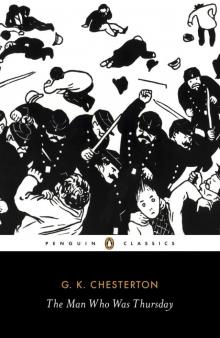 The Man Who Was Thursday: A Nightmare
The Man Who Was Thursday: A Nightmare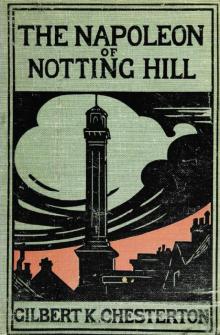 The Napoleon of Notting Hill
The Napoleon of Notting Hill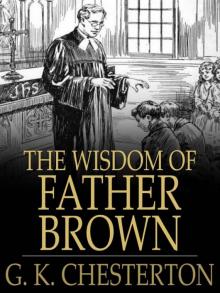 The Wisdom of Father Brown
The Wisdom of Father Brown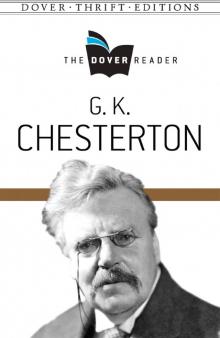 G K Chesterton- The Dover Reader
G K Chesterton- The Dover Reader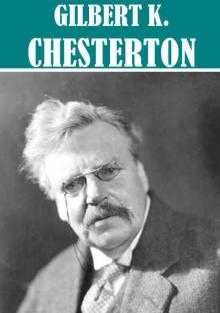 The Essential G. K. Chesterton
The Essential G. K. Chesterton The Trees of Pride
The Trees of Pride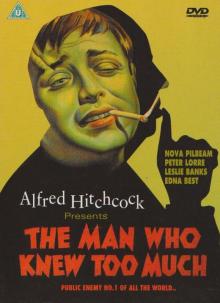 The Man Who Knew Too Much
The Man Who Knew Too Much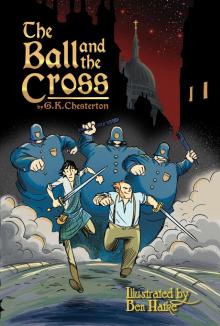 The Ball and the Cross
The Ball and the Cross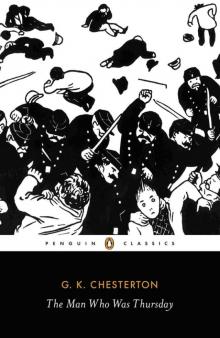 The Man Who Was Thursday (Penguin ed)
The Man Who Was Thursday (Penguin ed)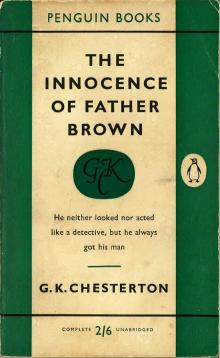 The Innocence of Father Brown
The Innocence of Father Brown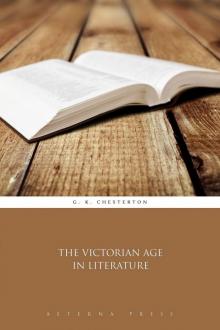 The Victorian Age in Literature
The Victorian Age in Literature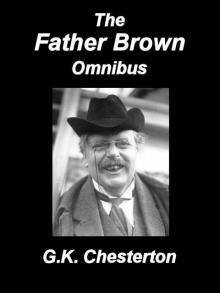 Father Brown Omnibus
Father Brown Omnibus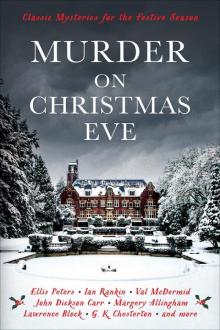 Murder On Christmas Eve
Murder On Christmas Eve The Blue Cross
The Blue Cross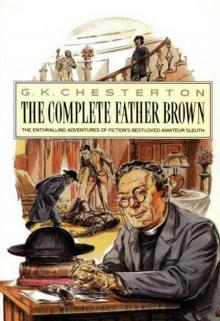 The Complete Father Brown Mysteries Collection
The Complete Father Brown Mysteries Collection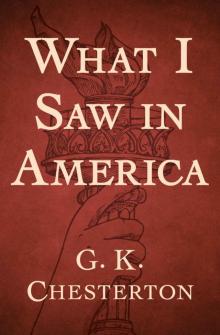 What I Saw in America
What I Saw in America